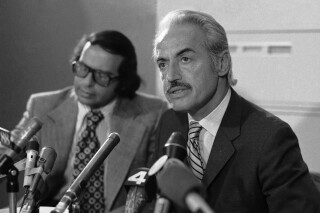Today in History: April 1, first pro baseball, hockey strikes begin, 20 years apart

Marvin Miller, right, executive director of the Major League Baseball Players Association tells newsmen, April 3, 1972 that the association has made a proposal to Major League owners in an effort to end the first general players strike in baseball. Listening at left is Dick Moss, players association lawyer. Miller spoke at a news conference following a meeting with owners representative, John Gaherin. (AP Photo)
Today in History:
On April 1, 1972, the first Major League Baseball players’ strike began; it lasted 12 days. Twenty years later, on April 1, 1992, the National Hockey League Players’ Association went on its first-ever strike, which lasted 10 days.
On this date:
In 1865, during the Civil War, Union forces routed Confederate soldiers in the Battle of Five Forks in Virginia.
In 1891, the Wrigley Co. was founded in Chicago by William Wrigley, Jr.
In 1924, Adolf Hitler was sentenced to five years in prison for his role in the Beer Hall Putsch in Munich. (Hitler was released in December 1924; during his time behind bars, he wrote his autobiographical screed, “Mein Kampf.”)
In 1945, American forces launched the amphibious invasion of Okinawa during World War II. (U.S. forces succeeded in capturing the Japanese island on June 22.)
In 1970, President Richard M. Nixon signed a measure banning cigarette advertising on radio and television, to take effect after Jan. 1, 1971.
In 1975, with Khmer Rouge guerrillas closing in, Cambodian President Lon Nol resigned and fled into exile, spending the rest of his life in the United States.
In 1976, Apple Computer was founded by Steve Jobs, Steve Wozniak and Ronald Wayne.
In 1977, the U.S. Senate followed the example of the House of Representatives by adopting, 86-9, a stringent code of ethics requiring full financial disclosure and limits on outside income.
In 2003, American troops entered a hospital in Nasiriyah (nah-sih-REE’-uh), Iraq, and rescued Army Pfc. Jessica Lynch, who had been held prisoner since her unit was ambushed on March 23.
In 2011, Afghans angry over the burning of a Quran at a small Florida church stormed a U.N. compound in northern Afghanistan, killing seven foreigners, including four Nepalese guards.
In 2013, Taylor Swift was named entertainer of the year for the second year in a row at the Academy of Country Music Awards.
In 2016, world leaders ended a nuclear security summit in Washington by declaring progress in safeguarding nuclear materials sought by terrorists and wayward nations, even as President Barack Obama acknowledged the task was far from finished.
In 2017, Bob Dylan received his Nobel Literature diploma and medal during a small gathering in Stockholm, where he was performing a concert.
In 2018, writer and producer Steven Bochco, known for creating the groundbreaking TV police drama “Hill Street Blues,” died after a battle with cancer; he was 74.
In 2020, resisting calls to issue a national stay-at-home order, President Donald Trump said he wanted to give governors “flexibility” to respond to the coronavirus. Under growing pressure, Florida Gov. Ron DeSantis joined his counterparts in more than 30 states in issuing a stay-at-home order.
In 2022, talks to stop the fighting in Ukraine resumed, as another attempt to rescue civilians from the shattered and encircled city of Mariupol was thrown into jeopardy and Russia accused the Ukrainians of a cross-border helicopter attack on a fuel depot.
In 2023, storms that dropped dozens of tornadoes killed more than 30 people in small towns and big cities across the South and Midwest.
